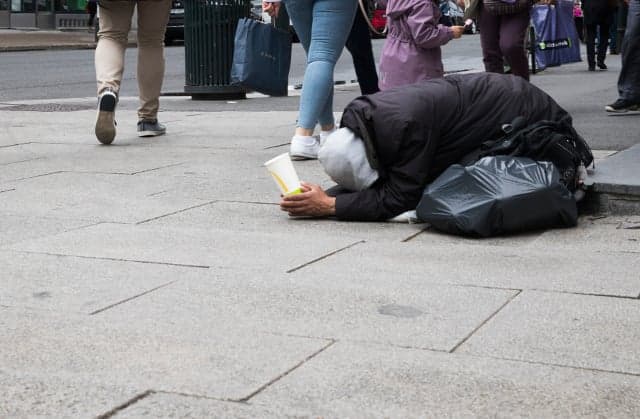Swedish county board stops Eskilstuna begging permit

Begging does not disturb the public order, a Swedish county administrative board said when it rejected the city of Eskiltuna's bid to make people apply for a permit before begging for money.
Last month a coalition between the Social Democrats, Moderates and Centre Party voted in the proposed regulation in Eskilstuna, a city west of Stockholm, as The Local reported at the time. The Sweden Democrats backed the move, which was opposed by the Left Party, Greens, Liberals and Christian Democrats.
Under the suggested measures, anyone who wanted to "passively collect money" on Eskilstuna's streets and public squares would have to first apply to the police for a licence. The council described the move as a way of better regulating begging with the aim of helping those living in hardship come into contact with homeless charities or getting help to travel home again, rather than banning the practice.
But on Wednesday the county administrative board in the region overturned the decision, saying it was not supported by Swedish legislation regulating public order (ordningslagen).
"We applied the regulations for street musicians, who also do not constitute a disturbance and do not need a permit. Our assessment is therefore that this [begging] also does not constitute a disturbance," the county board's legal expert, Karin Bergkvist, told news agency TT.
According to the county board, passive begging is limited to a small area and does not cause serious disturbance to public order or traffic and does not have a serious impact on safety.
Eskiltuna council's chairperson Jimmy Jansson said he was not surprised by the decision and said it was likely that the city would attempt to appeal it, if only to stir debate about the issue at a higher level.
"If nothing can be done, the ball is in the government's court. We have around 5,000 people living in awful conditions, in forests and under viaducts. We can choose to accept begging and see it as part of Sweden today. Or we can try to do something about it. After we try this, we have done what we can on a municipal level within the framework of current regulations," Jansson told TT.
READ ALSO: Sweden's first begging ban overturned by county board
Comments
See Also
Last month a coalition between the Social Democrats, Moderates and Centre Party voted in the proposed regulation in Eskilstuna, a city west of Stockholm, as The Local reported at the time. The Sweden Democrats backed the move, which was opposed by the Left Party, Greens, Liberals and Christian Democrats.
Under the suggested measures, anyone who wanted to "passively collect money" on Eskilstuna's streets and public squares would have to first apply to the police for a licence. The council described the move as a way of better regulating begging with the aim of helping those living in hardship come into contact with homeless charities or getting help to travel home again, rather than banning the practice.
But on Wednesday the county administrative board in the region overturned the decision, saying it was not supported by Swedish legislation regulating public order (ordningslagen).
"We applied the regulations for street musicians, who also do not constitute a disturbance and do not need a permit. Our assessment is therefore that this [begging] also does not constitute a disturbance," the county board's legal expert, Karin Bergkvist, told news agency TT.
According to the county board, passive begging is limited to a small area and does not cause serious disturbance to public order or traffic and does not have a serious impact on safety.
Eskiltuna council's chairperson Jimmy Jansson said he was not surprised by the decision and said it was likely that the city would attempt to appeal it, if only to stir debate about the issue at a higher level.
"If nothing can be done, the ball is in the government's court. We have around 5,000 people living in awful conditions, in forests and under viaducts. We can choose to accept begging and see it as part of Sweden today. Or we can try to do something about it. After we try this, we have done what we can on a municipal level within the framework of current regulations," Jansson told TT.
READ ALSO: Sweden's first begging ban overturned by county board
Join the conversation in our comments section below. Share your own views and experience and if you have a question or suggestion for our journalists then email us at [email protected].
Please keep comments civil, constructive and on topic – and make sure to read our terms of use before getting involved.
Please log in here to leave a comment.